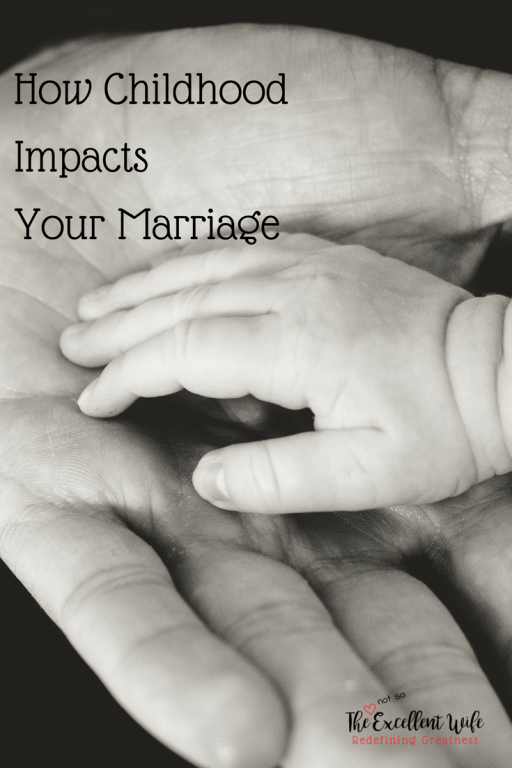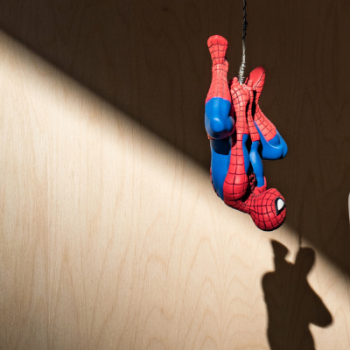What’s your problem? That was a common refrain early in my marriage.
Sometimes my husband’s reaction to something seemed way over the top. What appeared to be a minor thing evoked a response that was waaaaaay out of proportion. He’d turn a 50 cent issue into a $500 problem.
That seemed to be a pattern of communication early in our marriage. I’d get angry, withdraw and think, “Get over it” or “What’s the big deal?” or “He’s acting like such a baby.”

I began to understand what his problem was (or communication in marriage) better when I learned to look back at childhood behaviors and patterns. I began to understand what drives my husband’s behavior. And mine, too.
He’s all grown up so what’s childhood got to do with now? A lot. His patterns of relating to others were established long before he met me. And mine were established long before I met him.
Our childhood behaviors and the way we related to our parents establish how we’ll relate to others.
We come into marriage with a big old sack of emotional baggage whether we want to or not.
We form patterns of behavior early in life. Our greatest sense of identity– confidence and fears–is developed in our family of origin or the family we grew up in.
Why Childhood Affects Marriage
Learning about your husband’s family life can improve your marriage. Educate yourself not only on his childhood but also on yours.
It can make a world of difference in your marriage.
If you learn your husband was often forgotten or left out as a child, that might explain why he seems possessive or “needy.” Learning he was taught to keep a stiff upper lip, never show his emotions or “big boys don’t cry” might explain why he appears to be unfeeling, prideful or overly self-reliant.
You may accuse him of being distant, emotionally detached or unapproachable.
When you begin to understand the way he was raised, you can make an effort to extend unconditional love, which may encourage him to let down his defenses.
God created us with emotional intimacy needs. He also provides ways to get them met.
Even if your family didn’t discourage you from expressing needs, you may still find it hard to admit you them. No one wants to appear needy.
Having emotional needs doesn’t make you “needy.” It makes you human.
Think about your childhood and the messages you received growing up in your family. Examine your behaviors in relation to the messages you received. You may begin to understand why you react to certain situations the way you do.
Ask your husband about the messages he received growing up in his family.
Learning to meet each other’s emotional needs is critical to a healthy marriage.
So the next time your husband seems or overreact or seems distant or detached, instead of asking, “What’s your problem?” take a minute to consider what he may be feeling or why he’s reacting that way.
He might be experiencing a need that’s been left unmet. Learning to meet that need may be a turning point in your marriage.
Need skills to build intimacy?
- Get on the waitlist for my next group coaching session–Change Your Mind; Change Your Marriage.
- Visit my website, like my Facebook page and join my private Facebook group.
- Check out my FREE resources and download How to Be A Wife No Man Will Ever Want to Leave.
- Apply for private coaching with Sheila.
Subscribe to updates from The Not So Excellent Wife here!
Also known as the Not So Excellent Wife, Sheila Qualls understands how tiring a tough marriage can be.
She went from the brink of divorce to having a thriving marriage by translating timeless truths into practical skills. She’s helped women just like you turn their men into the husbands they want.
After 33 years of marriage, she’s a coach and a speaker whose passion is to equip women to break relationship-stifling habits and do marriage God’s way. And you don’t have to be a doormat to do it.
She and her husband Kendall live in Minnesota with their five children and their Black Lab, Largo.
In addition to coaching, Sheila is a member of the MOPS Speaker Network. Her work has been featured on the MOPS Blog, The Upper Room, Grown and Flown, Scary Mommy, Beliefnet, Candidly Christian, Crosswalk.com, The Mighty and on various other sites on the Internet.












